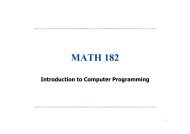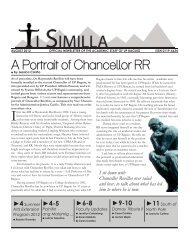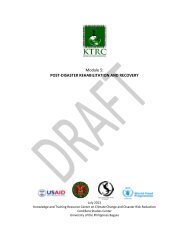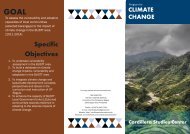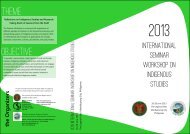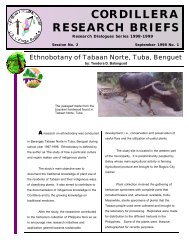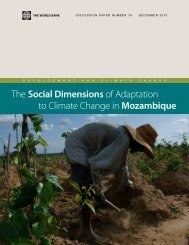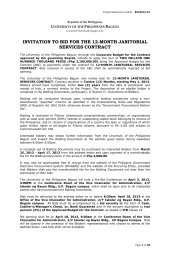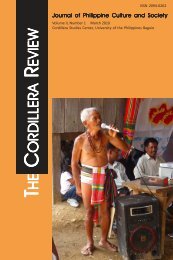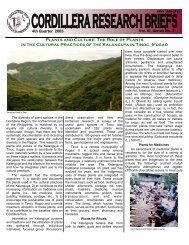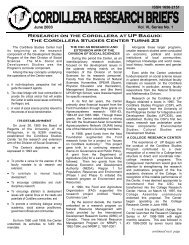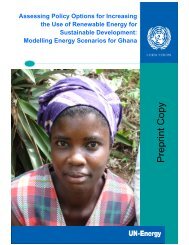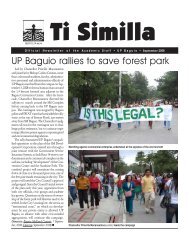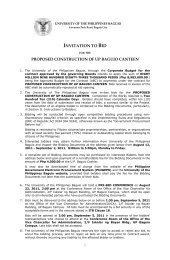July - UP Baguio
July - UP Baguio
July - UP Baguio
You also want an ePaper? Increase the reach of your titles
YUMPU automatically turns print PDFs into web optimized ePapers that Google loves.
Reportaccept. Believing that I was adequately selfreflexivein the writing of my paper, I wasshaken by this statement and I failed tohandle my emotion. Prof. Delfin Tolentinowitnessed my bit of dramatic acting and helater congratulated me on what he called ahidden Meryl Streep talent. I did not mindhis teasing because I was more concernedabout the fact that I would go down in JENhistory as the crying lady. On the next day,however, I discoverered that the lady whotalked to me immediately after my sessionto reassure me of my critical abilities is actuallysomeone who had a special place inProf. Tolentino’s romantic past. All myembarassment turned into one perpetualsmile.Excursion to erotica and melancholyOn the third day of the workshop, wehad an excursion to Bencab Museum at AsinRoad. National Artist Benedicto Cabrerahimself was there to indulge our querieswhich ranged from how he collected theitems in the museum to how he felt whenhe made nude paintings. It was my first timeto go to the museum which is a shame becauseit is just around here. We toured thegalleries like a flock of liberated geese speakingin gregarious intonations that we pickedup from gay panelists who administered a“foreign language class” every dinner time.Everyone, however, became uncomfortablysilent when we got to the Erotica Gallery.Maybe we were all wary of any ostentatiousdisplay of corporeal delight becausethat excursion was supposed to be part ofan intellectual exercise.The more somber part of that visit wasour encounter with the Cordillera Gallerywhich has an impressive collection of intricateand rare items most of which were madeby Ifugao craftsmen. Being half Ifugao, I wasjealous that Bencab has those items which Inever saw in my father’s hometown or atthe Ifugao Museum in Kiangan.But more than envy, I was inanother fit of internal dramaabout not being in touch withmy Ifugao heritage I guess becausemy father passed away sosoon and my attempts at makingconnection with his culturewere painful reminders.Prof.Tindaan (top row, left)Toast to criticism andreconciliationWhen all the sessions wereover on the 6th day, we wentto the famous Victor OteyzaCommunity Art Space(VOCAS) and we were receivedby Katrin de Guia whograciously turned the lights onagain because she was just leavingwhen we came. I was theonly fellow from <strong>Baguio</strong> so mycompanions seemed to expectmy annotations on everything in this city.Good thing it was not my first time inVOCAS so I assumed the all-knowing airof a tour guide in showing the art installationsand in identifying whichever part ofthe city they saw from the windows. Afterour chat with Ms. De Guia, we went for adrink at Rumours, what Prof. Campomanescalls the quintessential <strong>Baguio</strong> watering hole.I felt a tinge of guilt over being in Grace’sfavorite place while she could not becauseshe still had another day of enrollment duties.We probably exhausted everything thatcan be said about the comments we got onour papers during our lengthy evenings ofpost mortem the entire week but atRumours, even blatant conversation on eccentricitiesand pornography always tookthe route back to what this and that panelistsaid to who. Heightened by spirits, ourlaughters were becoming the sound of simultaneoustriumph and whimper. A fewhours into the night, two of our panelistsarrived to join us and eyes were on me becausehe who made that remark was there. Imanaged to avoid eye contact until he finallyapproached me to say sorry for themanner in which he made his comment. Icould tell my co-fellows pretended they weretalking to each other but they were all strainingto listen. I said to him that it was nothis remark that cracked my voice. Godknows I had worse in creative writing classes;I cried because I realized then, more thanbefore, that speaking from the inside is neverwithout burden and quiet suffering. In hisgay tenderness, he pinched my arm and saidhe hoped what he said will not stop me fromwriting. I raised my glass to say “Wis langun, ‘te!”<strong>July</strong> 2011 TI SIMILLA 7
Report18th Summer Institute in the Natural Sciences and MathematicsMarch 2011, <strong>UP</strong> BaguoTowards a Dynamic MathematicsEnvironment By Phoebe RamosMathematics professor speaks about thecultivation of a departmental culture ofmathematicsDr. Wilfredo Alangui, Dean, College of ScienceDr. Wilfredo Alangui observes that mathematicsand science education in the Philippinesis not as strong as we would like it to be. Althoughthere are various attempts to strengthenmathematics and science education, it is indeeda difficult challenge. In Northern Luzon forinstance, we are witnessing the abolition of BSMathematics programs in some universities andcolleges. One of the reasons for this is the unpopularityof the course among incoming freshmen.Perhaps, Dr. Alangui notes, this is becauseof the “failure to appreciate the importantrole of math in nation building.”If we are to assess basic education in thePhilippines, we find that there is insufficientmastery of basic competencies in mathematicsand science among Filipino students. In fact,the 2003 Trends in International Mathematicsand Science Study (TIMMS) ranks the Philippines34 th (out of 38 countries) in math and43 rd (out of 48 countries) in science.Dr. Alangui cites the absence of a “criticalmass” of competent and qualified teachers ofmath and science as one of the main reasonswe face a crisis not only in basic education buteven in higher education.Hence thereis slow progress inthe turnout of technicallycompetentMS and PhD graduatesin the natural sciencesand mathematics.Why is this vitalin the first place? It’sbecause the knowledgebase and economicfortunes of anation are maintainedand developedthrough the productionof highlytrained people and one measure of knowledgebase is the number of PhDs. Needless to say,we seem to be severely lacking in providing anadequate knowledge base. In the Philippines,the ratio of scientists and engineers in researchand development to its population is 157 whichis below the UNESCO benchmark of 340. ThePhilippines falls behind, compared with neighboringcountries (Japan: 5084, Singapore: 4613,Malaysia: 726, Vietnam: 516 and Thailand: 493).To address the crisis, Dr. Alangui proposesthat “math departments need to evolve intodynamic math environments.” A dynamicmathematics department is reflected in the vitalityof its undergraduate program, which includesall its members: faculty, office and staffand students. It should be able to set collectivegoals for the delivery of math education andimplement systematic changes in math instruction.In other words, the department shouldbe adaptive and responsive to the changes andchallenges in mathematics.Dr. Alangui highlights the role of studentsin creating that vitality. For most students infirst year university math courses, learningmath is not natural; it is cultural. These studentsarrive with the culture of their schoolmath classrooms. Often they have experiencedlittle flexibility in developing their own understandingof math since the approach to mathhas been constrained by an official textbook.Math is parceled into chunks and the studentsrarely see connections. Thus, (first year) studentsneed to experience the culture of the mathdepartment that they are joining; they need toparticipate in activities where they are expresslyexposed to this culture. Upper year math majorswho have integrated into the department’sculture can play an important role in helpingfirst year students make the transition to universitymath and experience the department’sgoals.Dr. Alangui concludes, “I also believe thatin order to increase math undergraduate majors,and to provide a balance between femaleand male participation, math departments mustfind a niche (and being dynamic will help developthis niche). If students perceive that thisniche will assist them to achieve their employmentgoals, the math department will be rewardedby increased undergraduate enrollments.”In addition, the need to move toward adynamic math department is also because ofthe continually changing body of mathematicalknowledge. Emerging are the areas of mathematicsapplications and modeling, which arein themselves generating new fields of puremathematics that are often studied outsidetraditional math departments.8 TI SIMILLA <strong>July</strong> 2011
ExcerptEssayOn Teaching and Being Taught By Marie Chris Ramoya“... there is a pedagogy that would learn from students”Like most unplanned events which carrywith them pleasant surprises, I came intothe teaching profession by something as anticlimacticas a default. I didn’t plan to teachwhen I shifted to Bachelor of Philosophyfrom AB Mass Communications in mysecond year at Saint Louis University. Ididn’t even plan to teach when I graduated(June 2003 from my undergraduate studies;November 2007 for my graduate studies –and though I was teaching then, I was stillsurprised that I was still doing it). That,however, does not mean that I seriouslyplanned to do something else, for I was oneof those people who went through collegebecause I knew it was important, andbecause I have a love for learning, but otherthan that, I, like most college students, hadonly a vague, nebulous conception as to howI was specifically going to put it to use lateron. Like most college students, I had plans,yes, but perhaps was too young or too lazyto seriously consider that it will be the restof my life I will be working for. In short,my attention span on my future then wasfilled with more whats than hows. Isomehow knew that whatever I find myselfin, I would be alright, but even then I knewthat that isn’t a very good way of starting aresponsible life after graduation. Thatconsidering, I never really sat down longenough to fix that view, or put somethingin its place. My education kept interferingwith my sense of life, so to speak, and I wasputting off the inevitable momentwhen myeducation would be terminated by a rompacross the stage.I started to teach June 2003, in my almamater. I think it was within the interveningtwo months from my graduation to myacceptance as Instructor of Philosophy thatall the preceding four years of myprocrastination walloped me in the face. Iwould’ve, no doubt, wanted to stay as astudent for as long as I can, however, andnot without a considerable amount of reallifequestions like “What am Ireally doing?” “Can I really dothis?” “How do they makeM&M’s seamless?” I took upteaching instead. And then Irealized that if I were to be aninstructor, I would still be astudent, albeit the one facing thechairs, not the one facing theboard.I remember submitting myresume with the objectives goinglike “To educate the youth byproviding as wide and coherenta perspective inasmuch as I amable as to the values within lifeitself,” or something to thateffect. I meant it, since I was alsotalking about educating myself,while hoping to high heavensthat I can actually say that I didmean it, and tried my very beststab at it.Questions as to myconfidence and social skills arose,with nowhere to go for themoment: I was already there,handling Logic, Ethics, andPhilosophy of Man courses. I am given tointrospection a lot, which makes me havethe social skills of a banana most of the time,and the confidence of a self-conscious box.However, like in most things, I learned toteach from being smack dab in the middleof teaching, and after a heuristic process thatcan rival the most determined of alllaboratory scientists, which still goes on tothis very day, I still am a student. I didn’treally think of myself simply as aninstructor, it still continues to be abifurcated unity, like an amoeba beforemitotic completion, but my mitosis takesfar longer – I am both an instructor and astudent. Like Freire would say, there is apedagogy that would learn from thestudents, while teaching the students in theTano Ramoya (left) with Prof. Leticia Tolentinoexchange. I stuck to that line not because itsounded profound; I stuck to it because themoment I stop learning is the moment thatI, and what I am, am done.I realize that that description of myteaching philosophy, being something thatstrides the middle of two identities, is proneto oversimplification from both ends. Icould come out as an instructor too stringentto be nothing but antagonistic to students,or as too unauthoritative and lax as aninstructor among students. I am neither.There’s an anecdote about a lawyer beingconsulted by a layman as to what particularlaw is advantageous to his particular case,whereupon the lawyer stood up and took abook from his library. Having found theright page, he answered the layman,June 2011 TI SIMILLA 9
Essay“ ... all the books in the worldwill not rival a lifetime of experience”explained a bit, and charged a hundreddollarfee. Outraged, the layman said,“That’s it?! I could’ve been the one toread that and gotten a solution for free!”The lawyer looked at him, smiled, andsaid, “Yes, but you don’t know whichbook to look for.” Teaching is somewhatlike that, which is to say, it is not exactlylike that. An instructor knows whichparticular book to look for, so to speak(the hundred-dollar fee being irrelevantto this explanation), and knows whichexplanation is suited for a particularcontext, but an instructor also knowsthat there are other books in the library.As such, the education of an instructordoes not end, for there might be anotherbook, and there almost always is, thatwill be more pertinent, more relevant, moreilluminating to his students than what hehad used. This is also helpful, in case of astudent who has read all the books hehimself did. An instructor also knows thatall the books in the world will not rival alifetime of experience, and that his studentshave themselves lived a definite span of theirlifetime. As such, it is not a contest as towho knows more, but it is a matter of doinga job, which is more than a job, it is acommitment. It is not a contest as to whosounds better; it is a matter of giving theprofession and its audience what it and theyare worth, and doing it well. It is a matter oflearning as well as you can, while teachingthe best way you know how.There are some courses which demandmore technical knowledge than, say, mentalgymnastics through the manipulation ofconcept implications; there are courseswhich demand more reflection than, say,memorization until drops of blood form onyour forehead from the sheer effort. Thereare some courses which demand, to borrowterms from photography, a wide-angled lens;there are some for which a lens with apenetrating focus is more apt. However,that categorization is somewhat misleading,for all those demands are, to certain extents,in all courses.I have had my share of courses withdemands as these; for instance, Social Science100 (the course description of which is amouthful – Historical and PhilosophicalDevelopment of the Social Sciences –recently changed to Historical Context ofthe Social Sciences, which is still a mouthful),a course which demands the widest-angledlens I could find, and technical knowledgeof important events spanning roughly thetwo thousand years of history I took up andimmediately forgot in my high school, andwhich I subsequently ignored in myundergraduate. That was another wallopin the face, for not only should I learn newthings, I also had to relearn, and re-view,which also means taking a look differentlyat the things I had forgotten. To put it morecrassly, as a friend of mine is fond of puttingthings of great value to himself, “Studentsrarely realize the secret to instructors andtheir seeming mastery: instructors cram likeheck at night.” Moreover, being aninstructor cramming like heck at night alsodemands an instructor attempting to dojustice to the subject matter in the day. Ontop of that, there is a paradox to all learning,which is this: among all the things one haslearned and re-learned, learning – and perhapswisdom – consists of knowing what todisregard. There is not a greater testamentto that, in all of the courses I have handledand am handling, than Social Science 100.Philosophy 27 (Philosophizing onBeing Human) is tricky as well, albeit ina different fashion. I see it likePhilosophy of Man, for they haveconvergent points and concepts.However, the approach, but not thedesired end, is different. Philosophy 27demands more from the student in termsof applying concepts to themselves,rather than seeing how these conceptsinterrelate in philosophy. It’s one of thecourses I feel most comfortable – orperhaps most confident – teaching, for itis in that course where the studentsthemselves are the subject matter. Thisis where the most significant question toany pedagogy arises, and arises fully: “Sowhat?” I often start a semester of that coursewith an activity requiring each student tochoose a word, a phrase, a book, anything –even a number, if they can manage to explainwhy – that describes themselves as theyknow themselves to be. From the occasionalcolor, fruit, animal, or sometimes a phraseseemingly incomprehensible until fullyexplained, or at times not even then, thepoint is that, if at the end of the course thestudent describes himself and argued for thatdescription the same way he did at thebeginning of it, the question confrontinghim would be one of whether or not he haslearned anything about himself, using thewhole course, that might widen, or change,his perspective of himself and his life. 10 TI SIMILLA <strong>July</strong> 2011
Alumni ProfilesIn Focus: Angela MalicdemBA Mass Communication (Journalism-Broadcasting), 2004Not Having It Any Other Way By Victoria CostinaAfter college graduation it tookawhile before Angela Malicdem foundwhere she truly wants to be, workingfor Innabuyog-Gabriela. First she washired as a management trainee at ahotel here in <strong>Baguio</strong>. Her work daysconsisted of monitoring cleanliness inevery room in the hotel as well as itsthree branches. She resigned shortlyafter getting hired. “I cannot have aChinese boss who keeps on yelling athis Filipino staff and calling them incompetentand stupid. Rather thangetting into a fight with the boss, Ichose to leave.”Then it was tutoring for Koreans,for basic English and ESL. She alsopart-timed as a data banker for NorthernDispatch, collating data from allsources and entering this into theirdatabase. Her co-workers were IBONFoundation researchers conductingquarterly surveys in northern Luzon.Of this, Angela says: “This allowed meto travel to all corners of northernLuzon, learning the ordinary people’sperception on latest events.” Thedatabanking department closed down,however, so Angela was introduced toTongtongan ti Umili, the Metro<strong>Baguio</strong> chapter of Bayan (BagongAlyansang Makabayan). As staffer ofTongtongan, Angela worked with localissues like the Jadewell case, as wellas national campaigns like the OustGMA effort and the Anti-Human SecurityAct Campaign. They were alsopart of campaigns to end extra-judicialkillings and political repressions.In April 2008, Angela moved toInnabuyog-Gabriela, a regional allianceof indigenouspeasantwomen inthe Cordillera,and alsothe regionalchapter ofGabriela.Women inInnabuyogrely on theland fortheir sourceof livelihoodand membershipin theallianceWith children of Bakundraws in women from the urban-poor,youth and students, migrant workers,gays and lesbians, professionals workingfor the church, the academe andprivate institutions.Angela now writes news articles,statements and features on “the toilingwomen of the Cordillera.” Shecontributes to the Innabuyog Newsletterwhich is published quarterly. “Ourwork in Innabuyog is mainly aboutorganizing the collective effort of Cordillerawomen towards advancingtheir struggle for social justice. Thecampaign is for land, food and rights.”This takes her to different provincesin the Cordillera to help women organize.What has drawn her to NGO workis the “individuality (that is promoted)and the free thinking.” About Cordillerawomen: “While I teach themabout the mechanics of a feudal-patriarchaland bourgeois-decadent Filipinosociety, they teach me about thesimplicity of life.” All this has kepther “grounded.”Studying in <strong>UP</strong> made her see the“diverseness” of people. The womenstudents of <strong>UP</strong> “… are so spirited.They freely exercise their rights.”Such openness shaped her. “In <strong>UP</strong> thefirst thing they taught was: Angkaalaman at pag-aaral ay hindinakukuha sa apat na sulok ng silidaralan.”But college life was fun, too.For Angela and her blockmates, “jokingwas the common denominator,”especially with her best friend DonnaDemetillo.Now asked about career options,Angela says: “This is what I consideras my path and I wouldn’t have it anyother way.”June 2011 TI SIMILLA 11
ReportFrom an Office Desk By Victoria CostinaAbigail Joyce Peralta, instructor from theCollege of Science, emailed information earlyon for the new faculty profiles in last month’sTi Similla issue, but this didn’t come through.We now thank her— and her online mailmanQuantum Lubrica— for sending this again sowe can do her profile. Abigail is a 2011 BSBiology graduate, cum laude, from <strong>UP</strong> <strong>Baguio</strong>.Her seniors thesis was entitled: Influence ofIncreased Temperature and Acidification onthe Development of Sea Urchin (Tripneustesgratilla) Larvae. The study evaluated the effectsof elevated temperature due to global warmingand reduced pH on the larval development ofthe sea urchin found in Bolinao, Pangasinan.Results showed that temperature considerablyinfluenced the developmental success of thelarvae regardless of the pH. Reductions in pH,on the other hand, did not significantly affectthe development of the larvae. It was inferredthat sea urchin development is most likely tobecome more affected by the anticipated risein sea water temperature than by acidification.All that is in Abigail’s words, of course. Shenow rightfully teaches Chemistry 31(Elementary Organic Chemistry) and itslaboratory component. She feels “blessed andhonored” to be part of the teaching staff of <strong>UP</strong><strong>Baguio</strong>, and wishes to pursue graduate studiesin the future. Her research interests are inmarine biology and microbiology. Abigail alsosees herself as a traveller who enjoys long tripsand new sights. She is inspired by support andappreciation from family and friends, leadingher to do her “best in everything.”Quantum also sent in correction on detailsfrom the profile done on him. Physics forEverday Life should be titled Physics 11, notPhysics 31. That’s the course, Physics 11, thathe had wanted to take as an undergrad. He’snow taking the course, from the teacher’s end.The core group for the alumnihomecoming in December continues to meetregularly at our spacious Alumni Center. (It isthe handsomest building on campus, withwindows that open up to pine trees all around).The main reunion events are listed on the <strong>UP</strong><strong>Baguio</strong> website and are posted on our Facebookpages. Also recently posted are the call fornominations for Alumni Awards, and anonline pre-registration form and accompanyinginstructions. The online pre-reg was set up byFara Manuel, a teacher in Fine Arts who isresponsible for the new face of the <strong>UP</strong>Bwebsite.We are heartened too by filmmaker andtelevision director Manny Palo’s commitmentto help out. He came up recently to meet withstudent dance group leaders and to conveyneeds for a production number on December15. Prior to this, there is a plan by Manny onstaging a one-act play with Angel Aquinostarring. If the play can be staged in November,this will be a fundraiser for the reunion. Thereunion effort is monstrous and AlumniRelations Deputy Lelet San Luis and I alwayshave a litany of things down on our to-donotebooks. But we are glad to have the coregroup working on specific assignments, andour meetings are chatty, laughing andproductive. The chief concern now is gettingsponsorships; we need funds for big expenseslike a goodsound system,Pasiklaban-like,that can backup theater-inthe-round.With Atty.Janice Domogan as finance officer, we areconfident about the money coming in,eventually. The <strong>UP</strong>B Cooperative is also gladlytaking on reunion memorabilia and othersouvenir items; we still have to talk aboutpercentages from sales.It’s hard to believe but I now survivemonthly Executive Staff meetings here at <strong>UP</strong><strong>Baguio</strong>. These are still of a marathon nature.“Matters arising from the minutes” take half aday to clear and then the agenda is tackled forthe rest of the day. If I’m not dozing off, I sitthrough this like one condemned, but amreprieved with good food, coffee for the takingand, most of all, by entertaining company. Oneof these is Benjie Marzan, Vice Chancellor forAdministration, who loves tutorials onlexicon. A word put to felicitous use bringstears to his eyes. For years now he hasn’t gottenover “unstinting.” To which I always say that,for him, the word is “unstainted” while DeanWilly Alangui has taught him “contumacious.”At last week’s meeting, Benjie had his ownvariant for “impoverished”: PuresaDolormente. And University Registrar JiRafanan, speaking in another context of“Ooooold Faculty,” herself referred to DeanDelima as Dean “Palima.” OFFICE OF PUBLIC AFFAIRS<strong>UP</strong> BAGUIO2600 BAGUIO CITY, PHILIPPINESTi Similla ISSN 0119-6634Published by the University of the Philippines <strong>Baguio</strong>through the Office of Public AffairsE-mail: opa@upb.edu.ph<strong>UP</strong> <strong>Baguio</strong> website: www.upb.edu.phVICTORIA RICO COSTINA, EditorGRACE SUBIDO, JIMMY FONG, RUTH TINDAAN, Associate EditorsKAREN BALLADA, QUANTUM LUBRICA, JENNIFER INOVERO,FARA MANUEL, DEEMSON MONES, ERLINDA PALAGANAS,SHEKINAH QUERI, PHOEBE RAMOS, MARIE CHRIS RAMOYA,LETICIA TOLENTINO, Staff WritersFREDERICK PEDREGOSA, ProductionENTERED AS SECOND CLASS MAIL AT THE <strong>Baguio</strong> City Central PostOffice, Upper Session Road, <strong>Baguio</strong> City WITH PERMIT NO. CAR-08.The views and opinions expressed in TI SIMILLA do not necessarily reflect the collectivestand of the academic staff or the official position of <strong>UP</strong> <strong>Baguio</strong>.



